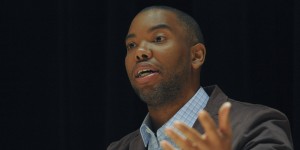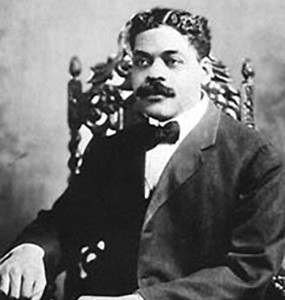Questions about the relationship between Senator Bernie Sanders and African American voters have dogged the senator from Vermont almost from the start of his presidential campaign. Last year it was based around his views on the Black Lives Matter campaign. In the last week, however, the question has been raised once again, this time by Ta-Nehisi Coates of The Atlantic. The rejection of reparations as a feasible, or even desirable, political goal by Senator Sanders was the occasion for Coates’ critique of Sanders and his particular brand of social democratic ideology. I believe, however, Coates’ arguments—and the pushback by some on the Left online—is a reason to revisit the long and complicated history of the relationship between Black Americans and the American Left.
It would be difficult, if not downright impossible, to do this topic justice in just one blog post. Instead, I’d like to help give this important conversation nuance by building up a small reading list of works that cover the history of Black Americans and the American Left. As always, feel free to add to the list in our comments section.
A recent work that does a wonderful job of situating this history within the larger history of the United States is Michael C. Dawson’s Blacks in and out of the Left (Cambridge: Harvard University Press, 2013). Dawson, a political scientist who has written extensively about African American political thought, makes a much needed contribution to understanding the Left from a Black perspective in this slim work. Originally  delivered as a series of lectures at Harvard (as part of the annual W.E.B. Du Bois Lecture series), Blacks in and out of the Left argues that the relationship between Black radicals and the larger American Left was always fraught with peril. Only when African American radicals had a modicum of strength within the Left—such as during the late 1960s—was the Left as a whole strong. Without African American strength, the Left as a whole would be imperiled.
delivered as a series of lectures at Harvard (as part of the annual W.E.B. Du Bois Lecture series), Blacks in and out of the Left argues that the relationship between Black radicals and the larger American Left was always fraught with peril. Only when African American radicals had a modicum of strength within the Left—such as during the late 1960s—was the Left as a whole strong. Without African American strength, the Left as a whole would be imperiled.
Revolutionaries to Race Leaders by Cedric Johnson is another good work on the topic of African Americans and the U.S. Left (Minneapolis: University of Minnesota Press, 2007). Covering the 1950s through the 1970s, Revolutionaries to Race Leaders covers the changing fortunes and priorities of African American radicals against the backdrop of the Cold War, the Civil Rights Movement, and the Black Power Movement. Of course, as the title suggests, the priorities of some of these radicals changed as the contours of American political and intellectual thought changed during thirty tumultuous years. The book gives significant coverage to the 1972 National Black Political Convention in Gary, Indiana, as well as the immense shadow of Harold Cruse over this history.
Of course, Cruse himself is someone who has to be on this reading list. His Crisis of the Negro Intellectual is still, almost fifty years later, an indispensable work. I have written before about the reaction among some on the Left to his work—but it is still worth reading on its own in regards to understanding African Americans and the Left. It is by no means a complete rundown of this history, but it is still worth reading as both an analysis of blacks and the Left as well as an intellectual document all its own. The works of Eddie S. Glaude, Jr.—especially In a Shade of Blue (Chicago: University of Chicago Press, 2007) and this year’s Democracy in Black (New York: Crown Press, 2016)—have also taken pains to examine the relationship between African Americans and the American Left. Democracy in Black, for example, is critical of American liberalism and what it has, or has not, done for African American citizens.
The history of American liberalism is one that should not be left out here. Lumping together liberalism with the American Left would be a mistake, both from the perspective of an intellectual historian and as an observer of American politics. The Haverford Discussions: A Black Integrationist Manifesto (Charlottesville: University of Virginia Press, 2013), a collection of primary source documents from the nearly-forgotten Haverford discussions of 1969. This conference at Haverford College was an attempt by some African American intellectuals to create a counter to both Black Power radicalism and backlash conservatism. The Haverford Discussions, edited by Michael Lackey, remind us that African American political thought includes as many factions and wings as American political thought, and that it would be a mistake to assume anything about African American political and intellectual history.
Finally, of course, our own roundtable on Coates’ essay on reparations provides some fascinating insights into the Left and African Americans in the late 1960s and 1970s. Read it if you want some further context on how some on the Left felt about reparations when the debate was at its most intense during recent American history.
On a related note, today is the birthday of Arturo Schomburg. Born in 1874, Schomburg made significant contributions to African American history by collecting numerous documents and artifacts that gave voice to the African American experience. Without his tireless work, it is difficult to imagine what the modern field of African American history would be like. American intellectual history would be poorer without Schomburg’s work. Happy Birthday Arturo Schomburg!


3 Thoughts on this Post
S-USIH Comment Policy
We ask that those who participate in the discussions generated in the Comments section do so with the same decorum as they would in any other academic setting or context. Since the USIH bloggers write under our real names, we would prefer that our commenters also identify themselves by their real name. As our primary goal is to stimulate and engage in fruitful and productive discussion, ad hominem attacks (personal or professional), unnecessary insults, and/or mean-spiritedness have no place in the USIH Blog’s Comments section. Therefore, we reserve the right to remove any comments that contain any of the above and/or are not intended to further the discussion of the topic of the post. We welcome suggestions for corrections to any of our posts. As the official blog of the Society of US Intellectual History, we hope to foster a diverse community of scholars and readers who engage with one another in discussions of US intellectual history, broadly understood.
Excellent post. I would add Robin Kelley’s work, especially Hammer & Hoe.
Thank you. And yes, definitely need Robin Kelley on this list. Also, his work “Freedom Dreams: The Black Radical Imagination” is worth thinking about for this list as well.
Timely and helpful list. Thanks, Robert.